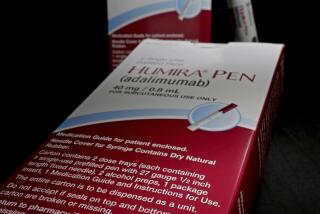Watson Suit Targets Generic Version of BuSpar
- Share via
Watson Pharmaceuticals on Wednesday renewed its legal effort to launch a generic version of Bristol-Myers Squibb’s popular anti-anxiety drug, BuSpar.
In a suit filed in U.S. District Court for the District of Columbia, Corona-based Watson said that Bristol-Myers used illegal tactics to prevent it from selling a cheaper version of BuSpar, which had sales of more than $700 million in 2000.
Bristol-Myers denied the allegations.
The lawsuit followed a court victory Tuesday for generic-drug maker Mylan Laboratories, which also plans a low-cost knockoff of BuSpar. In that case, U.S. District Court Judge Ricardo M. Urbina found that Bristol-Myers hurt the public interest when it took steps to extend its patent on BuSpar beyond Nov. 22. Urbina ruled that Mylan must be allowed to sell its version of BuSpar.
Bristol-Myers on Wednesday sought a stay of Urbina’s order to give it time to prepare an appeal.
The suits involve a new patent issued to Bristol-Myers by the U.S. Patent Office one day before its original patent on BuSpar was set to expire. Bristol-Myers brought the patent to the Food and Drug Administration, which told Watson and Mylan they couldn’t market their generic versions of the drug, which is often used in nursing homes.
Watson sued the FDA over the patent extension, but lost that case in January. Judge Frederic N. Smalkin of the U.S. District Court in Maryland said it was reasonable for the FDA to rely on Bristol-Myers’ representations about the new patent. However, he also said he couldn’t determine whether the patent was valid.
Mylan argued the new patent should not prevent it from marketing a generic version of BuSpar that was based on the old patent. The court agreed.
The patent controversies arise from a loophole in the Hatch-Waxman Act of 1984, which requires the FDA to delay approval of generics for up to 30 months if there are disputes over the patents between the original drug maker and a generic competitor. The law allowed Bristol-Myers to delay for nearly three years generic versions of its blockbuster cancer drug, Taxol. Consumer groups and generic-drug firms are pushing for legislative changes to close the loophole.
Watson, in its latest suit, is seeking triple damages from Bristol-Myers, which is believed to have sold $200 million of BuSpar since last November. Watson said the delay in selling its generic BuSpar cost the firm $18 million to $20 million in the quarter that ended Dec. 31 and probably will cost it $38 million to $40 million in 2001.
“The whole scheme that Bristol-Myers came up with on this patent was to extend unlawfully a monopoly on the BuSpar market,” said Robert Funsten, Watson senior vice president and general counsel.
Steven Lieberman, the attorney representing Mylan, said the drug maker would file a suit seeking damages in the next few days.
Neither company could say when their generics would reach the marketplace or what they would charge.
Watson’s stock rose $1 to close at $55.50, Mylan shares fell 60 cents to $22.15, and shares of Bristol-Myers dropped $2.11 to $58.89, all on the New York Stock Exchange.
More to Read
Inside the business of entertainment
The Wide Shot brings you news, analysis and insights on everything from streaming wars to production — and what it all means for the future.
You may occasionally receive promotional content from the Los Angeles Times.









